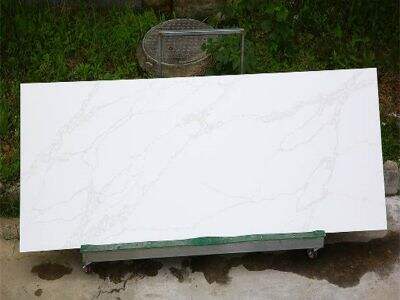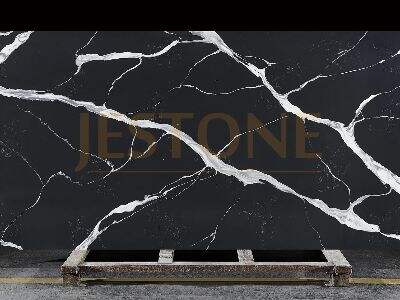عند اختيارك بين الحجر الطبيعي والكوارتز المصنع، من الضروري أن تفهم الفروقات الجوهرية بين هذين الخيارين الرائعين، بالإضافة إلى المزايا المختلفة لكل منهما. شركتنا هي فوتون، ولدينا خبرة في التصنيع الصناعي، ونعمل مع كلا المادتين الخامتين. ستساعدك هذه المقالة على معرفة الفروق الرئيسية بين الحجر الطبيعي والكوارتز المصنع، لكي يمكنك اتخاذ قرار مدروس بناءً على متطلباتك
تكوين الحجر الطبيعي مقابل الكوارتز المصنع: شرح
طبيعي حجر يتم استخراج الحجر الطبيعي، مثل الجرانيت أو الرخام، من باطن الأرض ثم يُقطع إلى ألواح. وهذا يعني أن كل قطعة فريدة من نوعها، ولا يوجد لونان أو نمطان متماثلان تمامًا. أما الكوارتز المصنع، فيتم إنتاجه عن طريق خلط كوارتز مطحون مع راتنج وأصباغ. مما يتيح له توافر عدد أكبر من الألوان وأنماط أكثر تناسقًا مقارنةً بالحجر الطبيعي. وعلى الرغم من أن الحجر الطبيعي يتمتع بسحر كلاسيكي، فإن الكوارتز المصنع يمتلك أنماطًا أكثر اتساقًا، وهو ما قد يكون مفضلاً في بعض أنماط التصميم

متينة وقوية: ما تحتاج لمعرفته عن الطاولات الطبيعية والهندسية
هذان الموادان صلبان جداً، ولكنهما ليسا متطابقين. طبيعي حجر هو في الواقع طبيعي 100% لذا هو أكثر مسامية ويمكن أن تلوث إذا لم يتم إغلاقه بشكل صحيح. الكوارتز المصنّع غير مسام، لذلك يقاوم البقع بشكل جيد بمفرده ولا يحتاج إلى إغلاق. عندما يتعلق الأمر بمقاومة الحرارة، الصخر الطبيعي يقف أفضل في درجات الحرارة العالية من الكوارتز الهندسي الذي يمكن أن يتلف إذا وضعت وعاء ساخن عليه
الحجر الطبيعي مقابل الكوارتز المعدل: مظهره و تنوعه
"الحجر الطبيعي جميل للغاية بطريقة لا يمكن نسخها مع ختم آلة" ، قالت ، "وهو يحتوي على كمية من الشخصية لكل قطعة واحدة". الكوارتز الهندسي، على الرغم من أقل تمييزاً لديه مجموعة كبيرة من التصاميم والألوان التي يمكن أن تتطابق مع أي منزل تقريباً. يمكن قطع كلتا المواد وتلائمها في أماكن مختلفة في المنزل مثل المطبخ والحمامات

تكلفة وصيانة الحجر الطبيعي مقابل كوارتز مهندس على شكل شاطئ لمطبخ من إعداد شركة ميلانيس للتجديد
من حيث التكلفة، يمكن أن يتفاوت الحجر الطبيعي بشكل كبير. فبعض الأنواع أرخص من غيرها، في حين أن بعضها - مثل الرخام - قد يكون باهظ التكلفة جدًا. أما الكوارتز الصناعي فهو عادةً ما يتراوح ضمن نطاق سعري معين، لكن ليس جميع المنتجات متساوية من حيث السعر، وقد يعتمد السعر على الجودة والتصميم. يحتاج الحجر الطبيعي إلى صيانة أكثر، لأنه يجب إغلاق مسامه دوريًا لمنع البقع. أما الكوارتز المهندس فهو أسهل في الصيانة لأنه لا يحتاج إلى الإغلاق ولا يصعب تنظيفه.
النقاش حول استدامة الحجر الطبيعي والكوارتز المُصنع
الحجر الطبيعي هو مادة متينة للغاية وتتطلب معالجته موارد قليلة، ولكن عملية استخراجه يمكن أن تكون ضارة بالبيئة. أما الكوارتز المُصنع الكوارتز ليست طبيعية بالقدر نفسه لأنها مصنوعة صناعياً، لكن يمكن التحكم في هذه العملية بشكل أكبر وتكون أقل ضرراً بالبيئة. هناك إيجابيات وسلبيات لكلا الخيارين من حيث الاستدامة، وغالباً ما يعتمد الاختيار الصحيح على تفاصيل المشروع والقيم الشخصية للأفراد واهتماماتهم بشأن البيئة
جدول المحتويات
- تكوين الحجر الطبيعي مقابل الكوارتز المصنع: شرح
- متينة وقوية: ما تحتاج لمعرفته عن الطاولات الطبيعية والهندسية
- الحجر الطبيعي مقابل الكوارتز المعدل: مظهره و تنوعه
- تكلفة وصيانة الحجر الطبيعي مقابل كوارتز مهندس على شكل شاطئ لمطبخ من إعداد شركة ميلانيس للتجديد
- النقاش حول استدامة الحجر الطبيعي والكوارتز المُصنع

 EN
EN
 AR
AR
 BG
BG
 HR
HR
 CS
CS
 DA
DA
 NL
NL
 FI
FI
 FR
FR
 DE
DE
 HI
HI
 IT
IT
 JA
JA
 KO
KO
 NO
NO
 PL
PL
 PT
PT
 RO
RO
 RU
RU
 ES
ES
 SV
SV
 TL
TL
 ID
ID
 SR
SR
 UK
UK
 VI
VI
 TH
TH
 TR
TR
 AF
AF
 GA
GA
 BE
BE
 HY
HY
 AZ
AZ
 BN
BN
 MN
MN
 MY
MY
 KK
KK
 UZ
UZ
 KY
KY
 XH
XH




